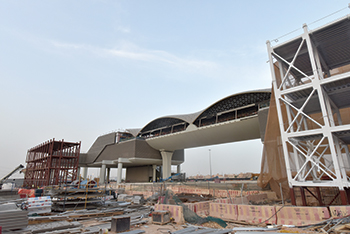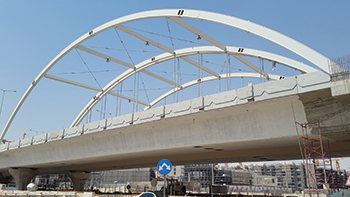ASF shows forte in fabrication
ASF has gained a reputation for high quality fabrication, and has undertaken work for several projects such as Riyadh Metro, petrochemical industries, and the financial and residential sectors.
01 July 2018
Al Sharq Factory Steel Industries Company (ASF), a Saudi-based structural steel fabricator, stakes claim to having contributed its services to some of the most prominent projects in Saudi Arabia, including the prestigious Riyadh Metro.
The Riyadh-based future-focused company has now set its sights on becoming an advanced fabricator equipped with robots and working on some of the key renewable energy projects that are expected to be part of Saudi Arabia’s Vision 2030.
ASF has gained a reputation for its high quality and its reliability even when tasked to take on the most difficult types of fabrication works, Zaid Abu Nsair, marketing manager, tells Gulf Construction.
ASF undertakes fabrications for various sectors of the economy including general contracting, oil and gas, power generation, petrochemical structures, electromechanical steel works, aviation, railways, marine and ports and other sectors.
Established in 2000 to serve the market demands of diverse steel fabrications, ASF offers high-quality products that conform to Saudi and international standards including steel structures, rail track/profile sections, steel façade works, secondary steel structures, dished end forming and flanging works, mixers, belt conveyors, chimneys, stacks, silos, vessels for cement plants and power plants.
 |
|
Al Sharq has carried out various steel fabrication works for the metro such as the canopy structures |
ASF is currently busy with the Riyadh Metro project, delivering steelworks, bridges, formwork, structural canopies for stations, and platforms tunnel segments for all the consortiums working on this mega transportation project.
Elaborating on its scope of works on the project, Abu Nsair says: “For Line Three which is being built by the Arriyadh New Mobility (ANM) consortium, the company is fabricating bridges and steel structures for shallow and deep underground stations, as well as canopy structures for the elevated stations, along with mega beams and huge trusses for the iconic Qasr Al Hokm station in the old downtown.
“For lines Four, Five and Six, being developed by the Fast Consortium, ASF is fabricating deep underground canopy structures as well as the PSD (passenger screen doors) structures, catwalks, special steel track trolleys, and lifting beams and walkway fences for the bridges, in addition to special formwork through the UK-based formwork and shoring specialist RMD Kwikform. ASF is also providing high-precision steelworks for the tunnels and tracks, including special brackets for the signal posts and cubicle supports, for France-based Alstom which is working on the tracks for these lines.
“For the BACS consortium that is involved with lines One and Two, we fabricated steel beams for the shallow stations in addition to special steel fences for walkways through Safid Company.”
Another major ongoing project being handled by ASF is the new Yamama Cement Factory, which involves production of fan housings, huge chimney stacks and major piping works along with other special steel structure works, he says. ThyssenKrupp Industrial Solutions is building the project.
ASF has contributed to several other mega projects in Riyadh including the Princess Noura University (PNU), where it fabricated and installed the secondary steel system for the facades of the medical colleges. This project involved a large variety of steel structure works and steel fences surrounding the university. Other works include 16 km of track rolling works and special galvanized handrails for the automated people mover (APM) inside the university.
 |
A bridge truss at Al Imam Road and Takhasusi Road Intersection for Riyadh Metro ... fabricated by ASF. |
Another landmark project for ASF was the King Abdullah Financial District (KAFD), which has involved work on the development’s iconic towers. “For these towers, we supplied and installed different types of steel structures for the mechanical, electrical and plumbing (MEP) works, steel façades and steel structures for civil works as well as for the link to the metro line, comprising attractive sculptural gateways.
“For this project, ASF has supplied special secondary steel structures for the façades and primary roofing steel structure systems to Permasteelisa Gartner, a leading façade company responsible for 17 towers at KAFD,” Abu Nsair points out.
Also at the KAFD, ASF has undertaken structural work for the cladding, facades and solar panels structures for contractor Saudi Oger.
ASF has also provided its expertise to key projects in the Western Province including the newly opened King Abdulaziz International Airport in Jeddah, where it was involved with works on a huge industrial building to accommodate a jet engine test cell for Cenco of the US, along with Al Muhaidib Contracting Company. It has also carried out structural steel fabrications of all types for the King Abdullah University Science and Technology (Kaust) in Jeddah.
Meanwhile for the Sharma resort project in Tabuk, the steel fabricator has provided special steel frames for the cladding and windows, skylight structures and other special works.
ASF has also handled fabrication work for other key clients including Saudi Binladin Group (SBG), Al Fouzan Trading and Contracting, Specialized Contracting Company (SCC) and Al Fanar Group of companies.
Having started out as a small workshop with 20 employees, ASF has expanded to comprise three workshops with 50 employees. Continued growth over the years prompted the company to purchase land in 2008 and build new facilities over an area of 25,000 sq m – which has since been increased further to 37,000 sq m by leasing adjacent plots. Its workshops are fully equipped with a variety of machines, conventional, CNC and robotic machines and studies are under way for a further expansion in the near future, Abu Nsair says.
Looking ahead, he says: “The future vision of our CEO Eng Tarek M Halabi is to transform ASF into a sophisticated factory with robotic fabrication lines, and taking on renewable and clean power investment projects which are part of the 2030 Vision of Saudi Arabia. We look forward to be the first to provide the latest technologies and unique equipment to the industry and reaching new markets in the region to serve the various business sectors.”
“We are optimistic about the future. Our business performance this year has been in line with our expectations, and with the market reinvigorated and many stalled projects recommencing with Saudi Arabia’s 2030 vision, further opportunities have opened for local manufacturers to contribute the mega projects,” he concludes.
- SAS installs striking ceilings in Muscat
- PLX on standby at Bahrain airport
- Wirtgen fleet at work on world’s biggest airport
- ASF shows forte in fabrication
- Aldes launches smart ventilation systems
- Hormann launches doors for conveyor systems



